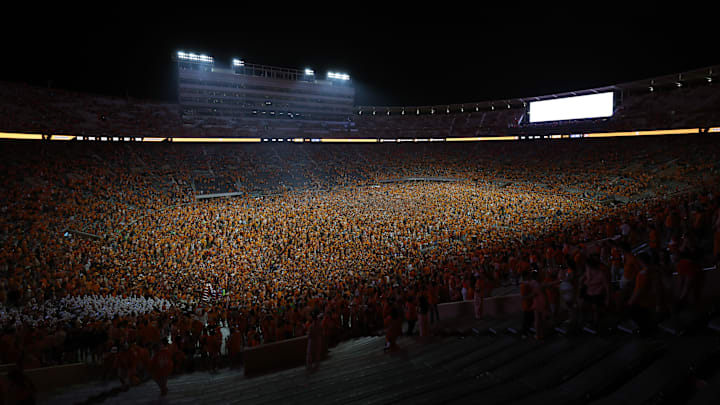Fan storming is one of the unique things about college athletics. Nowhere else will you see fans taking over the playing surface in celebration after a big win or upset. Tennessee Volunteers fans know a little bit about storming a football field after defeating a conference rival, but that could all be coming to an end due to recent injuries.
This year alone there have been two instances where players have came in contact with fans during a court storming. Iowa superstar Caitlin Clark collided with a fan after being upset by conference rival Ohio State. More recently, Duke center Kyle Filipowski also came into contact with a fan as a result of Wake Forest's court storming after the Demon Deacons 83-79 upset over the Blue Devils.
Filipowski and Clark both seem to be fine after their percieved injury on the court post-game, but that won't stop the conversation around court and field storming.
ESPN reports that there have been approximately three court stormings every week over the past three months, which a vast majority did not result in injuries. While there are rarely injuries tied to a court and field storming, every time there is an issue with a student-athlete or coach, there will be more pressure to ban fan storming for good.
There are already fines to discourage fans from storming the playing surface, but if fans aren't expected to pay the fine, why should they listen? The Southeastern Conference fined the University of Tennessee $100,000 after fans stormed the field after their 52-49 win over Alabama in 2022. The fines are the same when there is a court storming after a basketball game.
If you have ever been a part of a court or field storming, you would probably admit it was well worth it. Of course, there is risk every time fans storm the playing surface. Risk for players, coaches, and fans.
Going back to Tennessee's 2022 victory over Alabama, there was a viral moment from that field storming as well. It wasn't a player that was attacked, though. After Tennessee's victory over the Crimson Tide, an Alabama player took an unprovoked swing at a Tennessee fan.
A video appears to show Alabama WR Jermaine Burton hitting a female Tennessee fan while walking off the field during Saturday's postgame celebration.
— 247Sports (@247Sports) October 19, 2022
Nick Saban says Alabama is "aware of the situation" and "currently working to gather more information."https://t.co/FRHhkQzkLp pic.twitter.com/IBAu8xGGLg
Between excited fans, drunk students, and a fired up home team ready to celebrate their upset over a top-ranked opponent, it is going to be difficult to stop court and field storming in the future. What can schools, conferences, or the NCAA do to stop fan storming? Or what can they do to at least ensure player safety and security in the process of a court storming?
Maybe we should all be like Vanderbilt and be kind and courtious in our future court and field stormings knowing the consequences could result in injuries.
Possibly the slowest rushing of the field ever pic.twitter.com/La0nbgQxST
— Nick de la Torre (@delatorre) November 19, 2022
Single file lines FTW!
Believe it or not, the SEC fined Vanderbilt $250,000 for that field storming. But in all seriousness, we can't all be like Vanderbilt. With alcohol sales being available in most college venues, it is difficult to control a raucous crowd that is ready to join their favorite team on the court or field.
One option that has been proposed is for the winning team to forfeit the game if fans storm the playing surface. While I don't ever see this rule being enacted, it would be a strong deterrent in preventing fans storming the playing surface.
While Filipowski's injury has brought the anti-fan storming advocates into the spotlight, there are plenty of coaches, players, and fans that still embrace fan storming. LSU women's basketball head coach Kim Mulkey is still a fan of court storming. Mulkey even advocated for Tiger fans to storm the court if they win another national championship.
Maybe one solution to solving this problem is to only storm the playing surface when you upset the No. 1 team in the country, or maybe even the top-ranked team in your conference. This is one option that has been proposed, but everyone has to be on board when changing these expectations. Good luck trying to convince tens of thousands of fans on a Saturday in the Fall to agree to not upset a ranked rival as an unranked underdog.
When it comes down to brass tax, fan storming is a part of college athletics. It's fun, exciting, and fans get to experience a few moments on the field or court they fell in love with as a child. I love watching fans storm the field in the Fall, but I also understand that they could result in injuries. It is ultimately up to conferences and universities policing themselves and finding an effective way to protect players and coaches.
